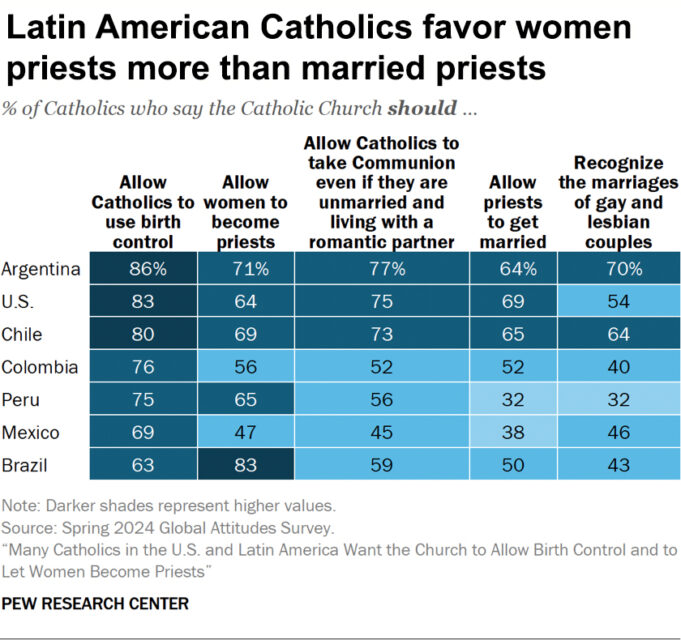VATICAN CITY (RNS) — The head of the Vatican’s doctrinal department issued a letter on Monday (Oct. 21) dashing hopes that Pope Francis will approve the ordination of women as deacons in the Catholic Church.
The statement, from Cardinal Victor Manuel Fernandez, who heads the Dicastery for the Doctrine of the Faith, comes after Francis’ efforts to build a more welcoming church had encouraged bishops and women’s advocates to make strong appeals to open the diaconate to female Catholics. It seemingly halted discussions about women deacons, who had already been relegated to a study group, beyond the purview of the Synod on Synodality, a churchwide meeting on the future of the church going on now in Rome.
“We know that the Holy Father has stated that the question of the female diaconate is not mature at this time and has asked us not to entertain this possibility now,” read Fernandez’s letter.
As the synod discussion began, controversial topics were quick to emerge, including the promotion of roles for women and the welcoming of marginalized Catholics, including members of the LGBTQ+ community. To streamline the synod discussions, the pope tasked 10 study groups of canon lawyers, experts and theologians to reflect on the most hot-button topics and issue a report in 2025.
A February study by the Pew Research Center found that 64% of U.S. Catholics support the ordination of women as priests. Another Pew report on Sept. 26 based on surveys in Latin America found overwhelming support for ordaining women priests, especially among younger Catholics.

“Latin American Catholics favor women priests more than married priests” (Graphic courtesy Pew Research Center. Headline by RNS)
Those sentiments were bolstered by the massive consultation of Catholics in every parish, bishops’ conference and diocese over the past three years called by Francis in the leadup to the Synod on Synodality’s meeting last October at the Vatican. Charged with defining the major issues facing the church and suggesting ways to make the church less hierarchical, many lay and ordained Catholics pointed to the role of women.
This month, at the second session of the synod, bishops, religious and lay people have gathered at the Vatican to draft a document summarizing the fears, hopes and expectations of Catholics worldwide.
But before the current meeting began, several study groups were formed to address the most controversial issues raised by the rank-and-file faithful. Study group 5 was charged with looking into accepting women into the permanent diaconate. Permanent deacons may preach at Mass, lead funeral services and perform baptisms, but unlike priests, they can’t say Mass, hear confessions or anoint the sick. (The transitional diaconate is reserved for men as a step toward the priesthood.)
Study group 5 was the only group put directly under the oversight of the Vatican’s secretive doctrinal department, and its membership was not disclosed. Fernandez revealed in Monday’s letter that the head of the study group is the Rev. Armando Matteo, secretary of the doctrinal section of Fernandez’s dicastery.
When presenting the work of Study group 5 on Oct. 3, Fernandez made clear that the pope was not in favor of allowing women to become deacons, citing an interview with the CBS News program “60 Minutes” in May in which Francis shot down the possibility. But many advocates for the female diaconate remained hopeful as long as the discussion was at the center of the synod debates.
Fernandez said in his letter that the group is still considering roles for women that don’t require ordination. “… Considering the diaconate for some women does not solve the issue of millions of women in the church,” Fernandez wrote, adding that other options are available to women, such as the ministry of the catechist and the acolyte.

Cardinal Victor Manuel Fernandez during a news conference at the Vatican, April 8, 2024. (AP Photo/Gregorio Borgia)
He noted, too, that male permanent deacons are rare and are often “mere ordained altar boys,” suggesting that the female diaconate is not “the most important answer to promote women.” Fernandez asked participants of the synod to submit their own experiences of ways that women act as “leaders in their community and occupy important roles of authority.”
Fernandez said the question of the female diaconate will continue to be studied by an earlier commission on women deacons created by the pope in 2020 and led by Cardinal Giuseppe Petrocchi. He also invited synod delegates to send their recommendations to the commission, one of two created to study the female diaconate by Francis in 2016 and in 2020. The findings of both remain secret, despite the requests to make them public.
On Friday (Oct. 18), members of Study group 5 were expected to meet with synod delegates to discuss the question of the female diaconate and listen to their considerations, but instead the meeting involved only two officials from the Dicastery for the Doctrine of the Faith who were not members of the study group and did not have the authority to answer questions.
In his letter, Fernandez said that he will meet with synod members on Thursday (Oct. 24), where he will also share the names of members of the study group.
“I am convinced that we can move forward step by step and achieve very concrete things,” Fernandez wrote, adding that nothing “in the nature of women” bars them from occupying important roles in the church.
RNS is an independent nonprofit dedicated to shining a light on the ways religion and faith help shape our world. Our coverage provides essential context, historical background, and nuanced commentary found nowhere else. If you value this kind of factual journalism, please consider becoming one of our supporters. Thank you for reading!
Deborah Caldwell, CEO and Publisher
Discover more from CaveNews Times
Subscribe to get the latest posts sent to your email.


























![Exploring the Serene Beauty of Nature: A Reflection on [YouTube video title]](https://cavemangardens.art/storage/2024/04/114803-exploring-the-serene-beauty-of-nature-a-reflection-on-youtube-video-title-360x180.jpg)


























